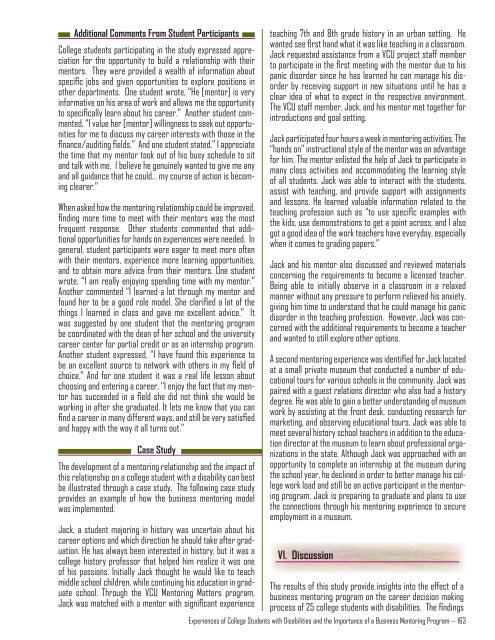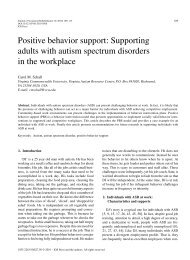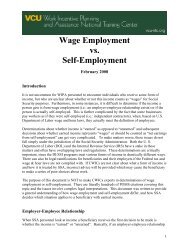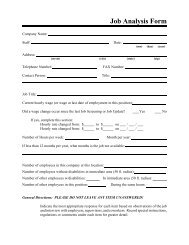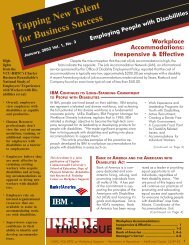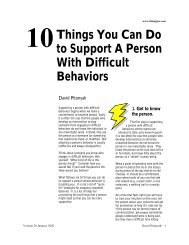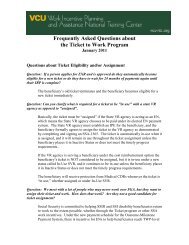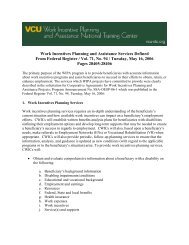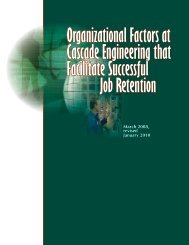E xperiences of College Students with ... - Worksupport.com
E xperiences of College Students with ... - Worksupport.com
E xperiences of College Students with ... - Worksupport.com
Create successful ePaper yourself
Turn your PDF publications into a flip-book with our unique Google optimized e-Paper software.
Additional Comments From Student Participants<strong>College</strong> students participating in the study expressed appreciationfor the opportunity to build a relationship <strong>with</strong> theirmentors. They were provided a wealth <strong>of</strong> information aboutspecific jobs and given opportunities to explore positions inother departments. One student wrote, “He [mentor] is veryinformative on his area <strong>of</strong> work and allows me the opportunityto specifically learn about his career.” Another student <strong>com</strong>mented,“I value her [mentor] willingness to seek out opportunitiesfor me to discuss my career interests <strong>with</strong> those in thefinance/auditing fields.” And one student stated,” I appreciatethe time that my mentor took out <strong>of</strong> his busy schedule to sitand talk <strong>with</strong> me. I believe he genuinely wanted to give me anyand all guidance that he could… my course <strong>of</strong> action is be<strong>com</strong>ingclearer.”When asked how the mentoring relationship could be improved,finding more time to meet <strong>with</strong> their mentors was the mostfrequent response. Other students <strong>com</strong>mented that additionalopportunities for hands on e<strong>xperiences</strong> were needed. Ingeneral, student participants were eager to meet more <strong>of</strong>ten<strong>with</strong> their mentors, experience more learning opportunities,and to obtain more advice from their mentors. One studentwrote, “I am really enjoying spending time <strong>with</strong> my mentor.”Another <strong>com</strong>mented “I learned a lot through my mentor andfound her to be a good role model. She clarified a lot <strong>of</strong> thethings I learned in class and gave me excellent advice.” Itwas suggested by one student that the mentoring programbe coordinated <strong>with</strong> the dean <strong>of</strong> her school and the universitycareer center for partial credit or as an internship program.Another student expressed, “I have found this experience tobe an excellent source to network <strong>with</strong> others in my field <strong>of</strong>choice.” And for one student it was a real life lesson aboutchoosing and entering a career, “I enjoy the fact that my mentorhas succeeded in a field she did not think she would beworking in after she graduated. It lets me know that you canfind a career in many different ways, and still be very satisfiedand happy <strong>with</strong> the way it all turns out.”Case StudyThe development <strong>of</strong> a mentoring relationship and the impact <strong>of</strong>this relationship on a college student <strong>with</strong> a disability can bestbe illustrated through a case study. The following case studyprovides an example <strong>of</strong> how the business mentoring modelwas implemented.Jack, a student majoring in history was uncertain about hiscareer options and which direction he should take after graduation.He has always been interested in history, but it was acollege history pr<strong>of</strong>essor that helped him realize it was one<strong>of</strong> his passions. Initially Jack thought he would like to teachmiddle school children, while continuing his education in graduateschool. Through the VCU Mentoring Matters program,Jack was matched <strong>with</strong> a mentor <strong>with</strong> significant experienceteaching 7th and 8th grade history in an urban setting. Hewanted see first hand what it was like teaching in a classroom.Jack requested assistance from a VCU project staff memberto participate in the first meeting <strong>with</strong> the mentor due to hispanic disorder since he has learned he can manage his disorderby receiving support in new situations until he has aclear idea <strong>of</strong> what to expect in the respective environment.The VCU staff member, Jack, and his mentor met together forintroductions and goal setting.Jack participated four hours a week in mentoring activities. The“hands on” instructional style <strong>of</strong> the mentor was an advantagefor him. The mentor enlisted the help <strong>of</strong> Jack to participate inmany class activities and ac<strong>com</strong>modating the learning style<strong>of</strong> all students. Jack was able to interact <strong>with</strong> the students,assist <strong>with</strong> teaching, and provide support <strong>with</strong> assignmentsand lessons. He learned valuable information related to theteaching pr<strong>of</strong>ession such as “to use specific examples <strong>with</strong>the kids, use demonstrations to get a point across, and I alsogot a good idea <strong>of</strong> the work teachers have everyday, especiallywhen it <strong>com</strong>es to grading papers.”Jack and his mentor also discussed and reviewed materialsconcerning the requirements to be<strong>com</strong>e a licensed teacher.Being able to initially observe in a classroom in a relaxedmanner <strong>with</strong>out any pressure to perform relieved his anxiety,giving him time to understand that he could manage his panicdisorder in the teaching pr<strong>of</strong>ession. However, Jack was concerned<strong>with</strong> the additional requirements to be<strong>com</strong>e a teacherand wanted to still explore other options.A second mentoring experience was identified for Jack locatedat a small private museum that conducted a number <strong>of</strong> educationaltours for various schools in the <strong>com</strong>munity. Jack waspaired <strong>with</strong> a guest relations director who also had a historydegree. He was able to gain a better understanding <strong>of</strong> museumwork by assisting at the front desk, conducting research formarketing, and observing educational tours. Jack was able tomeet several history school teachers in addition to the educationdirector at the museum to learn about pr<strong>of</strong>essional organizationsin the state. Although Jack was approached <strong>with</strong> anopportunity to <strong>com</strong>plete an internship at the museum duringthe school year, he declined in order to better manage his collegework load and still be an active participant in the mentoringprogram. Jack is preparing to graduate and plans to usethe connections through his mentoring experience to secureemployment in a museum.VI. DiscussionThe results <strong>of</strong> this study provide insights into the effect <strong>of</strong> abusiness mentoring program on the career decision makingprocess <strong>of</strong> 25 college students <strong>with</strong> disabilities. The findingsE<strong>xperiences</strong> <strong>of</strong> <strong>College</strong> <strong>Students</strong> <strong>with</strong> Disabilities and the Importance <strong>of</strong> a Business Mentoring Program -- 163


